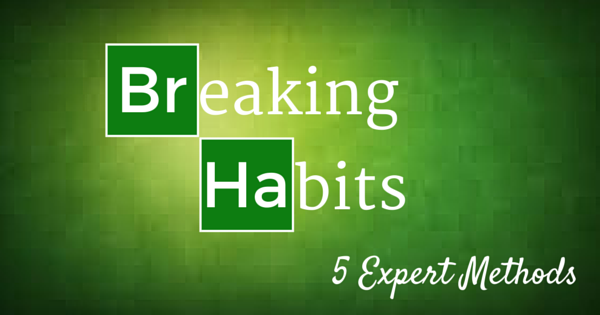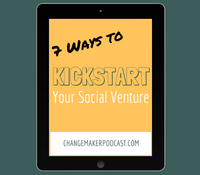Get more good stuff.

Whether breaking a bad habit or starting a new one, the routines that we choose to follow shape who we are and how we impact the world.
According to Stephen Guise, bestselling author of Mini Habits, nothing is more important than our habits…
“Habits form about 45% of your total behavior, according to Duke University. Not only that, but they are behaviors that you repeat frequently, which compounds their significance in your life. Habits are your foundation, and if this foundation is weak, you won’t be happy with the way you live.”
― Stephen Guise, Early to Rise exerpt
I compiled advice from 5 experts teaching us how to transform our habits so that we can do something greater.
5 Expert Methods to Transform Our Habits:
“But until a person can say deeply and honestly, ‘I am what I am today because of the choices I made yesterday,’ that person cannot say, ‘I choose otherwise.’”
― Stephen R. Covey, The 7 Habits of Highly Effective People: Powerful Lessons in Personal Change
1. Keystone Habits
 Charles Duhigg, reporter at the New York Times and bestselling author, says that as our time is limited, we should focus on “keystone habits.” Keystone habits are those habits that have the power to start a chain reaction, transforming other habits.
Charles Duhigg, reporter at the New York Times and bestselling author, says that as our time is limited, we should focus on “keystone habits.” Keystone habits are those habits that have the power to start a chain reaction, transforming other habits.
“Keystone habits start a process that, over time, transforms everything.”
In his book, The Power of Habit, he mentions that exercise is a keystone habit. For example, exercising for just 5 minutes a day could trigger a cascade of other positive events – eating healthier, feeling more positive and confident, improving our relationships, reaching business goals.
To help us with how to find keystone habits, Charles blogged about 3 common characteristics.
2. Start With Why
Tricia Molloy, corporate leadership speaker and author, believes that change requires starting with “why.”
“Knowing “why” will keep you going when times get tough and the inevitable obstacles get in the way.”
In order to get to the core of “why” a change is important, Tricia recommends that we spend some time to dig deeper with these steps:
1. Determine what your goal is. Then write down all of the benefits gained from achieving this goal.
“Don’t edit yourself. Just write. Get emotional. For example, if you want to lose weight, those “whys” might include:
- Feel better.
- Look younger.
- Be healthier.
- Live longer.
- Enjoy more energy.
- Fit into my favorite clothes.”
2. Validate your benefits with another layer of questioning.
“Go a step further and ask, “So what?” For example, feeling better and enjoying more energy will certainly enhance your relationships with your family and friends, as well as your coworkers and clients. And, being healthier equates to less time and money spent at the doctors.”
The results should support your motivation to make a change and maintain it.
“When you get crystal clear about the reasons behind a goal, you will be much more motivated to reach it.”
3. The Power of One Push-up
Our willpower is a limited resource; meaning if the task is too big we will feel overwhelmed and give up. With a goal of starting a 30 minute workout routine, Stephen Guise felt like giving up even before he started. Instead of abandoning the new routine completely, he asked himself, “what if I do just one push-up?”
That single push-up turned into one pull-up, which eventually (and surprisingly) resulted in a 30 minute workout. Stephen applied this concept in other areas of his life and found that mini habits were the key to his success.
“It works because your brain falls for the bait.”
He recommends that instead of committing to writing 1000 words per day, commit to something small like 50 words a day. “Stupid small” as Stephen puts it – so small that it sounds stupid when you say it out loud. Once you start, he finds that you will almost always do more.
“When you remove the pressure and expectations, you allow yourself to start.”
See Stephen’s 10 Daily Mini Habit Ideas to try this method out.
4. Clarity, Vision, and Control
Tracey Gritz, business productivity expert and owner of The Efficient Office, has led many people through change. She shared a straightforward, 4-step guide on how she personally starts and maintains new habits:
I am clear on my reason for change (is it for my highest and greatest good…or to look good…or ‘cause it’s what other people think is good, etc.).
I visualize HOW I am going to change it…I mentally walk myself through what I’m doing and how I’m doing it and how I feel after doing it.
I start with only one thing.
I have some sort of accountability.“
5. Savor the Habit
Leo Babauta, founder of Zen Habits, recommends that when establishing a new habit or making a change we need to savor it. He says a new habit is not a sacrifice or a burden that you need to take in order to get you to your ultimate goal. The new habit is you realizing your goal.
“If you want to eat healthier, learn to enjoy the taste of this delicious, fresh, healthy food. An apple can be just as delicious as any junk food snack, if you pay attention and savor it.
If you are exercising, pay close attention to and enjoy the moving of the body, the feeling of exertion, the flow of blood through your brain, the focus.
If you are writing, sit with the words and enjoy the quiet concentration, the exhilaration of creation.
Learn to enjoy the habit, and the habit will become its own reward. The goal isn’t some distant achievement, but the process itself.”
